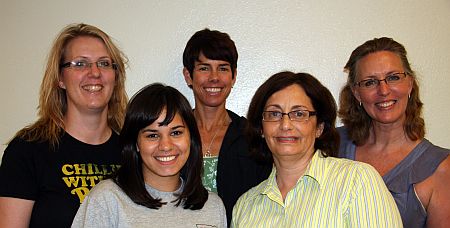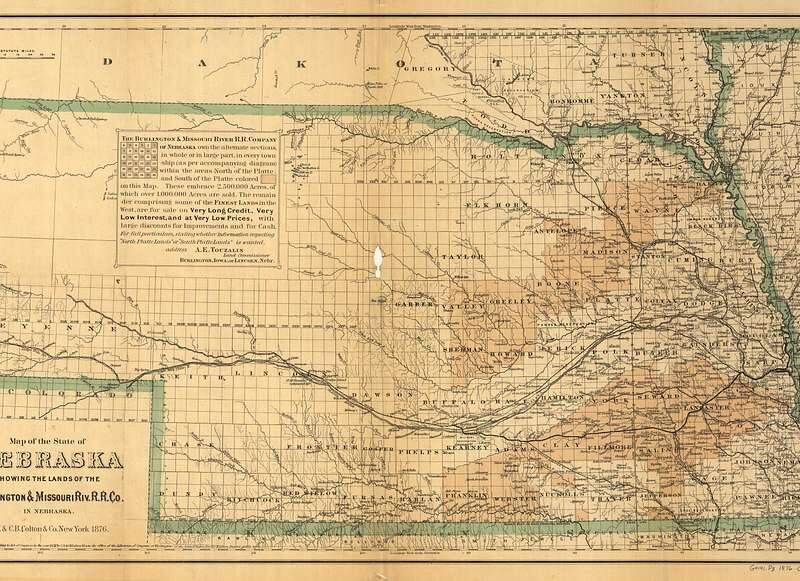While teachers all over the state of Nebraska spent their summertime rejuvenating after a long 2009-2010 school year, 17 new teacher consultants got busy writing, inquiring, and EQUIPping during the Nebraska Writing Project Summer Institute held on the UNL campus June 7-July 2. The Summer Writing Institute has long been the portal by which teacher consultants from all over the country enter into a series of institutes, professional inquiry, and involvement.
Leading the charge in Nebraska is Writing Project Director Robert Brooke with 2010 co-facilitators Susan Martens, Carol Mertl and Diana Weis, all of whom share a passion for writing and professional collaboration.
“I love being around the number of ideas and talented people,” said Diana Weis. “It reminds me what a gift and art good teaching is.”
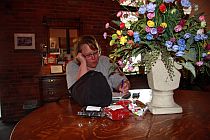
These talented teachers often express their desire to write for themselves, but often say that a lack of time prevents them from engaging in meaningful writing. During the Summer Institute, TCs were again able to focus on their own writing and receive valuable feedback from others.
“My four weeks of immersion into the act of writing increased my confidence as a writer and desire to share my writing with readers,” said Jessica Rivera. “While I know that I need to continue to practice my craft and feed my soul, my affection for listening and sharing stories with people—a feeling once buried in my childhood—has returned.”
Another component of the Summer Institute is the research-based inquiry project. Teams this year researched a wide variety of topics including Writers’ Workshops, Technology and Writing, Social Justice and Writing, Dual Credit Writing Instruction, and Place-Based/Community Education.
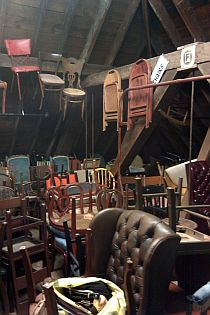
“After taking this class, I have a different view on this statement, ‘research-based,’” said Brenda Larabee. “Initially, I looked at the phrase ‘research-based’ as a limiting and constraining item. Now, I look at my classroom as a research space and myself as a researcher.”
In addition to the writing and research, Teacher Consultants presented EQUIP demonstrations—a 60-minute lesson followed by a 30-minute discussion. Not only did EQUIPs give teachers an opportunity to share best practices, it also allowed them the opportunity to participate in others’ demonstrations and add to their repertoire.
“The EQUIP presentations were highly motivating,” said Monique Poldberg. “Although our Institute this summer was mainly secondary teachers, I feel that most of them could be adapted to my elementary writing instruction. I learned so much about different genres of writing and was able to try them out!”
Dr. Brooke hopes TCs take with them “a stronger sense of themselves as writers with something to share, a set of teaching practices and resources that have worked for other teachers, and a sense of being part of a community of teachers who will continue to help each other do our best work” as they depart the Summer Writing Institute.
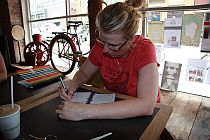
The Institute’s small writing groups are often described as one of the most important elements of the Institute. Friendshipsand close professional ties often emerge as a result. This year was no different. The “Sidewalk Hogs” continue to share their writing on a regular basis.
“Our group [officially named The Divine Secrets of the Tree-Huffing Sidewalk Hogs] bonded really strongly from the very first day and the writing marathon where we had our adventure trying to get into the prop room of the Temple building,” said Susan Martens.
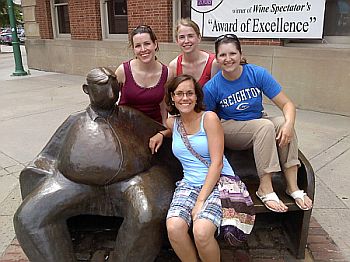
“We still meet approximately every other week at different locations around downtown [Lincoln],” she added. “We bring whatever we feel like or whatever we are working on, from poems to conference proposals. Mostly we just enjoy seeing each other and talking about what’s going on with our graduate programs. Our group is lucky because we all work in Lincoln and can get together easily.”
Dr. Brooke often witnesses lasting friendships form as a result of the Institute.
“Because everyone who participates in the Summer Institute is an expert teacher with something to share, and because that expertise is valued in every aspect of the Summer Institute, relationships between teachers are easy to build,” said Dr. Brooke. “We’re able to explore our own real issues in our writing and our teaching, without defensiveness, in a context of real sharing.”
As a last hurrah, members from the 2010 Summer Institute gathered at Old Chicago in the Haymarket on Jan. 22 for lunch, fellowship, and to collect their 2010 anthologies. The reunion was short lived, though, as yet another winter storm barreled through eastern Nebraska, sending people home early and causing others to cancel altogether.
Rivera, who worked on the 2010 SI anthology committee and organized the reunion said, “While an impending snowstorm prevented some from joining the lunch, those that gathered enjoyed seeing one another and catching up on our work as readers, writers, and teachers.”
Those who could not attend the reunion should have received their anthologies in the mail.

